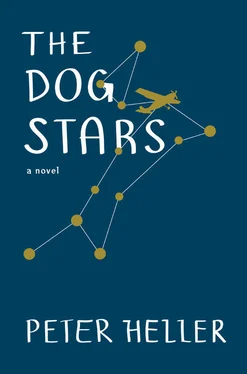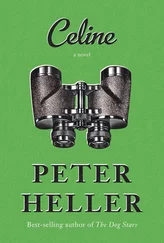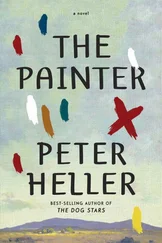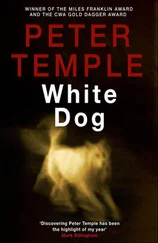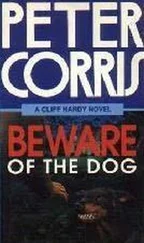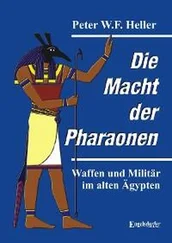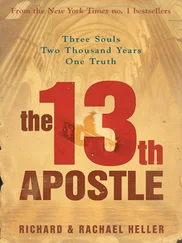Aaron said Aren’t you going to bring Jasper down?
I blinked at him, half turned back to the plane, then just stood. Couldn’t breathe for a sec.
They were all watching me, I could feel it like a pressure. I hung my head down, watched a drop of salt water hit the dirt. Wiped it away.
Hig are you okay?
Aaron was bent forward, his thin back, his turkey neck, the beard. Land of the lost. Talk about being already dead. I straightened up.
He died Aaron. On the mountain. In his sleep. He was old.
I could almost see the wave of shock sway the little group. The last death here had been a child, Ben, a boy of eight or nine who got so excited, more than anyone when I landed the plane and carried Jasper to the ground. Many times he forgot the rules and bounded across the zone shrieking with glee and reached his arms out to the dog who stood up off his haunches and wagged and like the figures on the Grecian Urn he never got there, never attained his goal—always some long armed parent or aunt scooped him up with a mild scold.
I’m sorry Hig. We’re all sorry.
The sincerity of it, the dignity. After what they had all lost and. It didn’t matter. It was mine, my family. The second tear that spilled I wiped away and I told myself there wouldn’t be another. Not in front of them.
Thanks.
A little girl stepped forward. Her name was Matilda. She had a handful of wild asters. She crossed to the middle of the Zone and lay it on the ground and smiled at me.
I picked them before, she said. For you.
Just as a present?
She nodded, looking up at me. She smiled, pretty, her skin waxy, dark rings around her eyes.
Thank you, I said. Thank you. And I broke down. Just stood there in front of them all and wept, wept uncontrollably, shuddering, and smiled at the girl through the tears. Her own smile faded and she looked scared and stepped back into the skirts of her mother and I felt bad but couldn’t help myself. It was Jasper, not just. It was all of it. Was this hell? To love like this, to grieve from fifteen feet, an uncrossable distance?
I picked up the flowers but didn’t step back. They were all little more than an arm’s length away, two.
Thank you, I said to them all. Jasper loved coming here.
Which was true. I think the scent of children made him happy.
The flowers are beautiful. I sniffed them. Mmmmm. Wow.
Grinned. The girl smiled again from where she hung on the woman’s skirts.
You put up the flag?
Aaron nodded. The last time was a week after the last Sprite. The solar water pump they used to draw from the creek to irrigate had died, just a bad fuse but they didn’t have one and I did so the next morning I brought one. Now a tall woman stepped through from the back. She was stunning, half her face. The disease had not yet claimed her vigor. Half her face had been burned horribly, some kind of gas explosion. When she talked she turned the burned half away and looked at you from the side and seemed to speak to air. Her name was Reba like the country singer of before and she could sing too, I had heard her. She held out a cracked plastic pickle bucket and I took it, hand to hand, the first time ever, and inside it brimmed with early baby lettuce.
We are having a bumper crop, Aaron said. I remember you saying you didn’t grow it for some reason. We thought. He trailed off.
I smiled. I squatted down and reached out my hand to the little girl who had given me the flowers.
Go ahead her mother said.
She held out her little hand grubby with dirt and I took it and squeezed it lightly and smiled. I met her hazel eyes, a little bloodshot with the immune system war raging inside her, and held to her tiny fingers for a long moment, held to them like they were a rope and I was a man drowning.
The beans were already sprouting, showing the little curl just out of the turned dirt. The water was running in the furrows. I told Bangley I was heading out again.
We were in his shop which was the old sunken living room of a Mcmansion to the north of my hangar. It looked out of big double paned plate windows to the west, away from the runway to the mountains. It was a gunsmith shop plain and simple. Bangley made no excuses about knowing nothing about engines, wood, carpentry of any kind, agriculture, especially agriculture, gardening, cooking, especially cooking, languages, history, math beyond arithmetic, fashion, leatherwork, gin rummy, sewing, or especially rhetoric—the decorum, the customs of a respectful rhetorical debate.
Spit it out Hig is what he liked to say in the last instance. Spit it out and don’t pull any goddamn punches. It’s just you and me here ha ha! No one else to impress.
But he knew guns, knew how to modify them, improve them, and he could build one from the ground up, from pipe and old flatware. In the box trailer he pulled behind his pickup on the afternoon he showed up at the airport he brought with him a heavy drill press, a welder, a generator, grinders, a band saw. When I pointed out that these skills—the welding, the soldering, the tempering—that they were applicable to all kinds of metalwork, he chuffed his gravel laugh.
Got no use for that is all he’d say.
He had also brought with him about fifty posters, all girls in bikinis or less holding various weapons and bannered with the great names in small armaments from Colt through Sig to Winchester. They were tacked up all over the walnut paneled walls where framed paintings used to hang, taped even to the edges of the windows. They were shooting submachine guns holding pistols in the low ready position like a fig leaf and sometimes not bothering to cover their total nakedness at all and the pain they caused me, I mean the sight of unclad women, actually constricted my throat so I kept my visits to the bare minimum so to speak. Ha. When I did go I hailed him from the yard and waited for a yell back, an invite maybe, trying to train him to do the same and stop giving me a heart attack at my hangar which I knew to be fruitless.
We got plenty of venison, Hig, he said straightening from a large pipe in a vise.
After our dustup the other day he announced that he was going to build a grenade launcher. He actually had one, an M203, but the range was inadequate to save my ass, he said, so he was going to rebuild it. More accurate he said.
Can’t have the Hig getting concussed anymore, makes him too goddamn goofy.
Now he straightened and squinted at me while I tried not to look at the homicidal naked girls. Weird: on a low table, by the leather couch he had decided to keep, was a framed picture of the family that had lived here: some ski vacation, three blonde kids in helmets, parkas, their parents standing behind holding skis and smiling broadly, teeth as white as the snowy mountains in the range behind them. Top of one of the mountains at Vail or somewhere. I never asked about it. I intuited that it was not as simple as being reminded of the filial warmth that once pervaded, but more likely some Bangley score keeping, like: Look you Yuppie motherfuckers, you had all that but who is here in your sunken living room today, healthy as a horse and crafting better weaponry so he can keep ahold of it like you couldn’t.
Just a guess.
You thinking you need another fishing vacation? Last one wasn’t exciting enough?
Shook my head. I’m flying.
Flying?
Grand Junction. Got a transmission from there a little while ago. From the tower.
His hands, which I thought of as paws they were so big and blunt looking, they let go the pipe, set down the file. He looked at me under the hanging gun rack he’d had me build for him in the beginning—he never did anything without a platoon’s worth of firepower within reach.
Читать дальше
